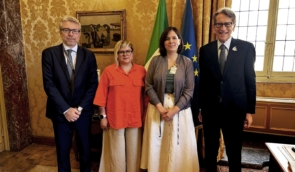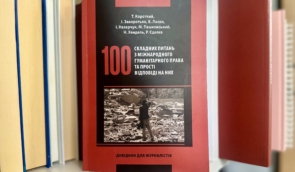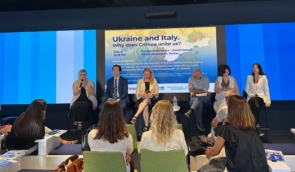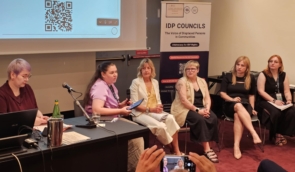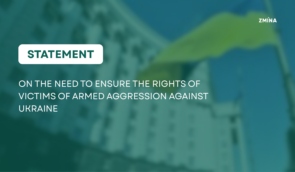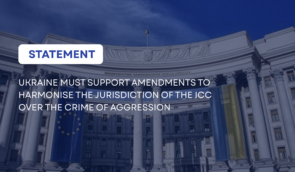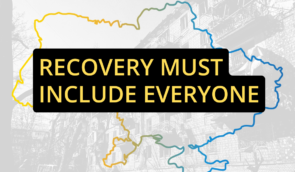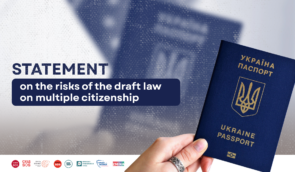International community should react to illegal mobilization in Crimea – human rights defenders
On September 21, 2022, Russian President Vladimir Putin announced a “partial mobilization” which was immediately rolled out in Russia and in the temporarily occupied territories of Crimea and Sevastopol. According to available data, the aggressor state plans to mobilize 300,000 people, including 10,000 residents of occupied Crimea.
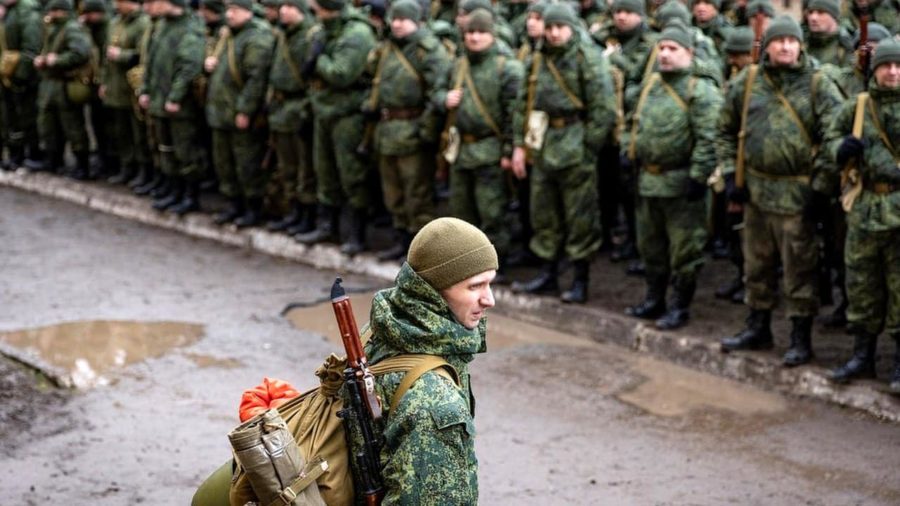
Since 2015, the Russian Federation has been drafting Crimeans for conscript service in the occupying power’s army which is a war crime according to Art. 8 (2)(a)(v) of the Rome Statute of the International Criminal Court. Before the start of the full-scale invasion, more than 34,000 Crimeans fell victim to this war crime. Moreover, the Russian Federation forced many Crimeans to participate in hostilities against Ukraine which is another war crime in accordance with Art. 8 (2)(b)(xv) of the Rome Statute of the International Criminal Court. Some of them were already killed.
The mobilization of Crimeans, which began on September 21, 2022, will significantly increase the number of Ukrainian citizens who will fall victim to war crimes. The published figures show that the scale of mobilization in occupied Crimea is much higher than in Russia. Thus, the occupiers intend to mobilize every 200th Crimean, while in Russia – every 500th Russian.
Forced mobilization in occupied Crimea is overtly discriminatory and targets mainly the Crimean Tatars. The Crimean Tatars are very concerned about the fact that, according to their observations, most summonses are served to representatives of their people who have been subjected to Russian repression for many years. Crimean Tatars see this as another tool used by Russia within its policy of extermination of the indigenous population. Speaking to international and domestic audiences, the Russian Federation constantly declares that it is allegedly fighting “Nazism” and “fascism”, involving in practice a disproportionately large number of representatives of non-Russian peoples in hostilities against Ukraine. This is confirmed by the disproportionately large share of residents of Dagestan, Buryatia, and other national subjects of the federation killed in this war of aggression. Similar fears about the Crimean Tatars are exacerbated by the fact that the indigenous people of the Crimean Peninsula have been subjected to systematic oppression and forced deportations during the times of the Russian Empire, the USSR and since the beginning of the Russian occupation in 2014. In particular, about 80% of Crimean political prisoners are Crimean Tatars, and about 75% of unlawful searches in the occupied Crimea account for representatives of the indigenous people.
Brutal methods of mobilization in Crimea are of particular concern. The cases have been recorded when the occupiers served summonses in schools, healthcare facilities, at checkpoints, as well as fraudulently during cries for help. There have been many cases when, after serving summons, Crimeans were forcibly put on a bus and taken to a military enlistment office. This arbitrariness occurs amid increased criminal liability for evasion of mobilization.
Forced mobilization and other atrocities in Crimea have become possible due to the untimely and insufficiently decisive reaction of the international community to the occupation of Crimea, Russia’s invasion of Donetsk and Luhansk regions in 2014, as well as to the arbitrariness of the occupiers in the occupied territories of Ukraine.
Russia’s defiant disregard for almost all norms of international law shows that the only way to stop forced mobilization, discrimination of Crimean Tatars, and massive violations of human rights in occupied Crimea is the earliest possible de-occupation of the peninsula with the help of existing diplomatic, sanction and legal measures, in particular the right to self-defense, provided for in Art. 51 of the UN Charter. Delayed de-occupation of Crimea and other territories of Ukraine will only lead to an increase in the scale of war crimes and the number of their victims.
In this regard, we, representatives of Ukrainian human rights organizations, call on the relevant Ukrainian government agencies to:
- Effectively investigate all cases of forced mobilization of Crimeans and their involvement in hostilities
- Draft and pass amendments to the Criminal Code of Ukraine to define clear grounds for the exemption of Ukrainian citizens from criminal liability over forced mobilization (conscription) in the occupied territories and participation in hostilities against their own state
- Cooperate with the Office of the Prosecutor of the International Criminal Court and foreign states in prosecuting the “military commissars” in Crimea and others involved in these war crimes
- Initiate strengthening of sectoral sanctions against the Russian Federation over forced mobilization in occupied Crimea
- Use diplomatic tools to protect Ukrainian citizens from forced mobilization in the occupied territories and to facilitate their departure to the territory of third countries
We call on the governments of foreign states, in particular the participants in the International Crimea Platform, to:
- Strongly condemn the forced mobilization of Ukrainian citizens in Crimea and other occupied territories of Ukraine
- Prosecute “military commissars” in Crimea and other persons involved in these war crimes in accordance with Art. 146 of the Fourth Geneva Convention and Art. 88 of Additional Protocol I and cooperate in their investigation with law enforcement agencies of Ukraine
- Provide comprehensive assistance to Ukrainian citizens who evade forced mobilization in Crimea and other occupied territories of Ukraine, in particular by facilitating their departure from the territory of Russia or Belarus and providing temporary protection in your territory
- Increase comprehensive, particularly security, support for Ukraine with the aim of the earliest possible de-occupation of all territories of Ukraine, including the Crimean Peninsula, as it is impossible to protect the Ukrainian citizens from the occupiers’ mass atrocities without de-occupation
- Maximize the use of Crimea Platform, the mechanisms of the UN, the Council of Europe, the OSCE, and other international organizations for a timely and effective response to forced mobilization and other human rights violations in occupied Crimea
- Strengthen sectoral sanctions against the Russian Federation over forced mobilization in occupied Crimea
We call on the Office of the UN High Commissioner for Human Rights, the UN Independent International Commission of Inquiry on Ukraine, the UN Special Rapporteur on Minorities Issues, the UN Special Rapporteur on the Rights of Indigenous Peoples, the UN Permanent Forum on Indigenous Issues, the Council of Europe Commissioner for Human Rights, the PACE Committee on Legal Affairs and Human Rights, the OSCE High Commissioner on National Minorities, the OSCE Office for Democratic Institutions and Human Rights, the International Committee of the Red Cross, and other international organizations within their mandates to:
- Strongly condemn the forced mobilization of Ukrainian citizens in Crimea and other occupied territories of Ukraine
- Provide comprehensive assistance to Ukrainian citizens who evade forced mobilization in Crimea and other occupied territories of Ukraine
- Continue to monitor and document human rights violations, war crimes, and crimes against humanity in occupied Crimea and include them in regular reports on the human rights situation in Ukraine
- Assist the law enforcement agencies of Ukraine in investigating war crimes, crimes against humanity, and gross human rights violations in occupied Crimea, including cases of forced mobilization
CrimeaSOS
Center for Civil Liberties
Human Rights Centre ZMINA
Human Rights Center “Action”
Association of Relatives of the Kremlin Political Prisoners
Ukrainian Helsinki Human Rights Union
If you have found a spelling error, please, notify us by selecting that text and pressing Ctrl+Enter.

